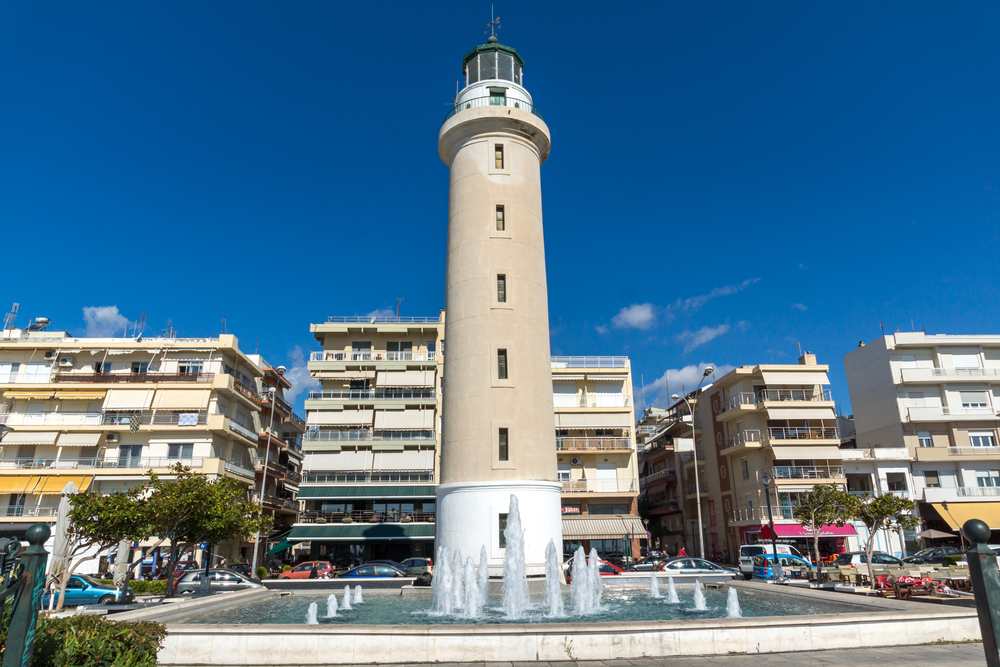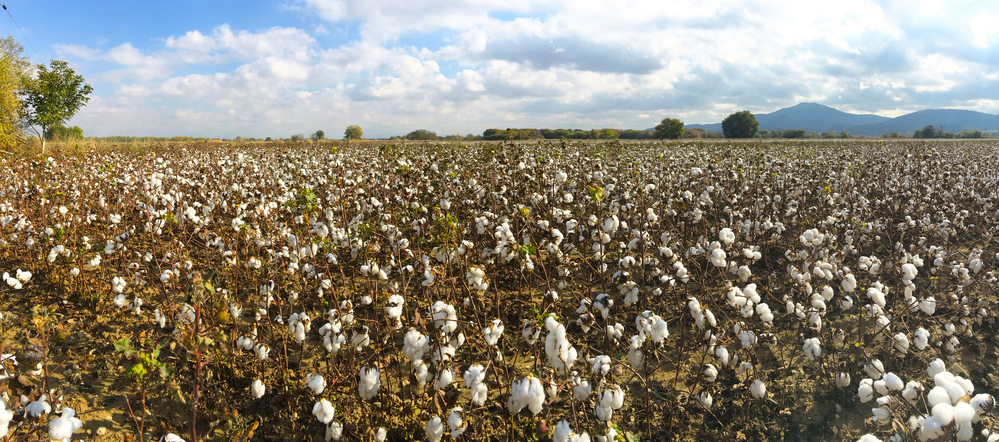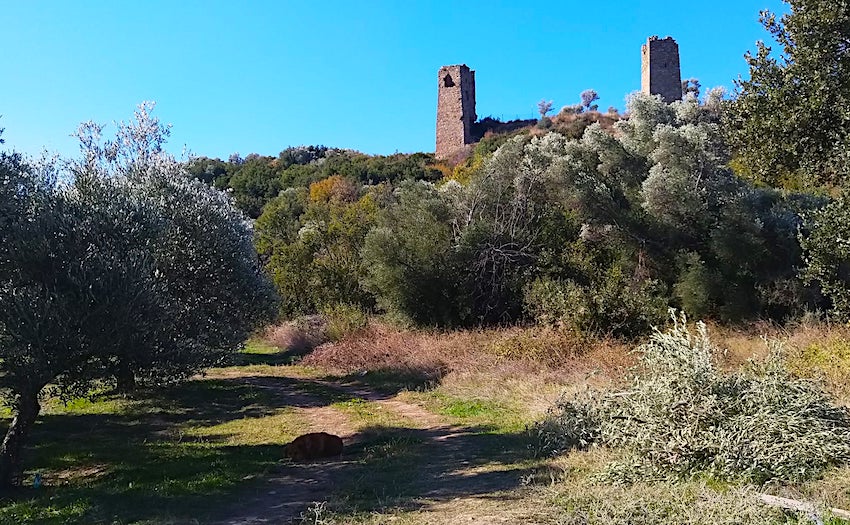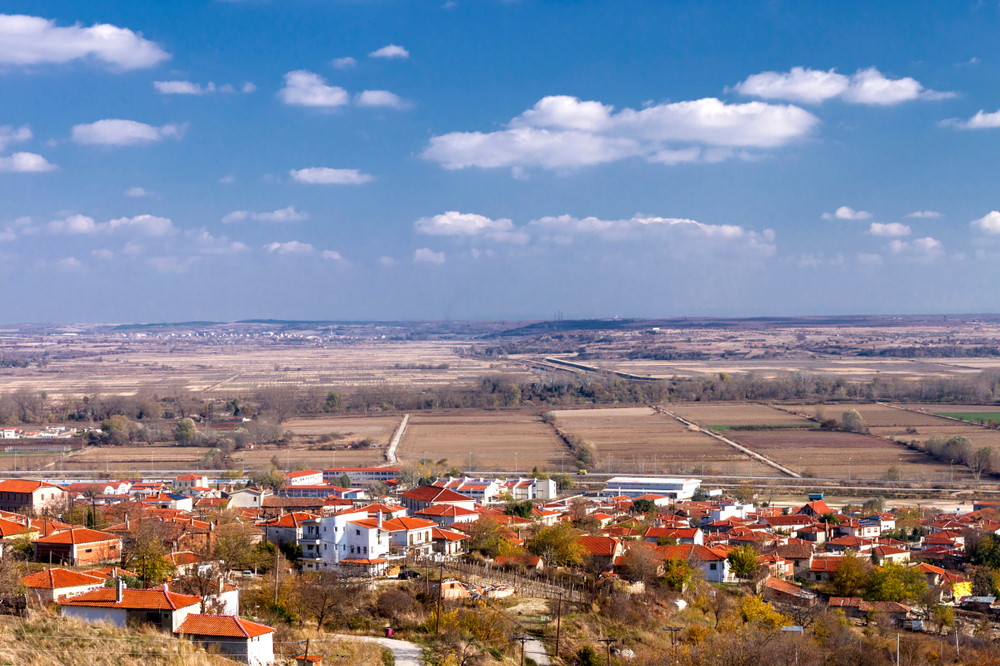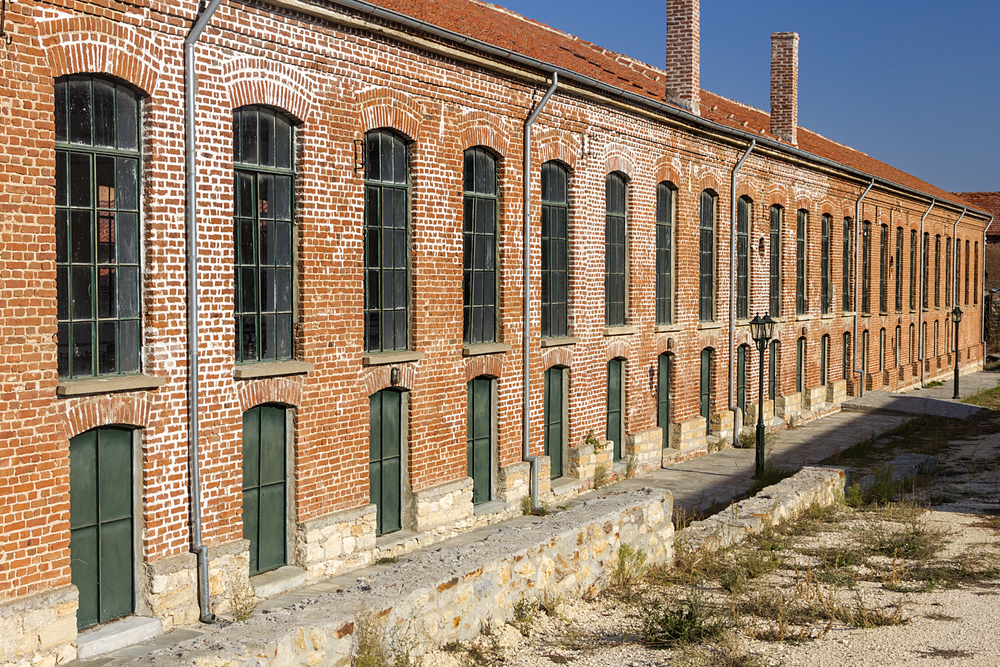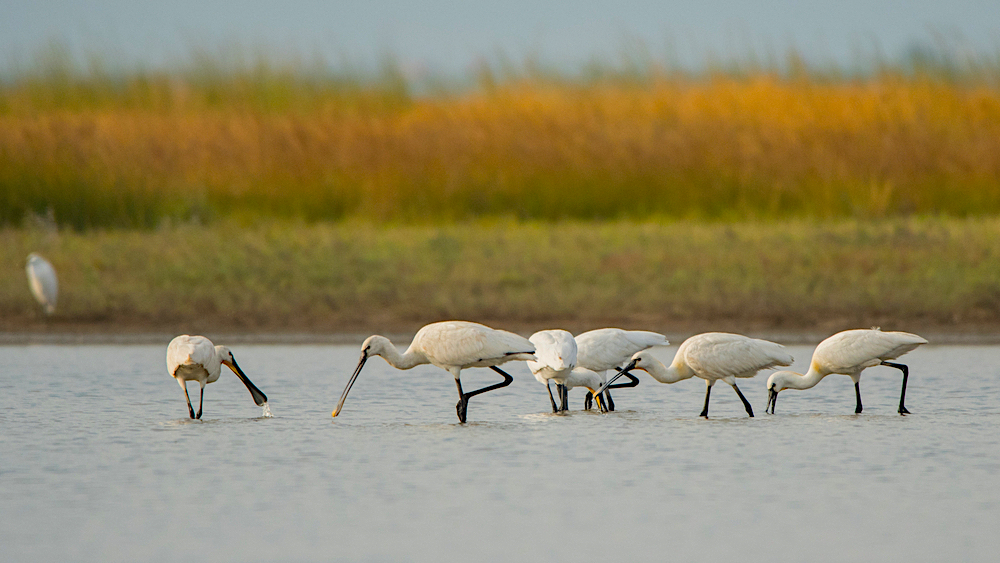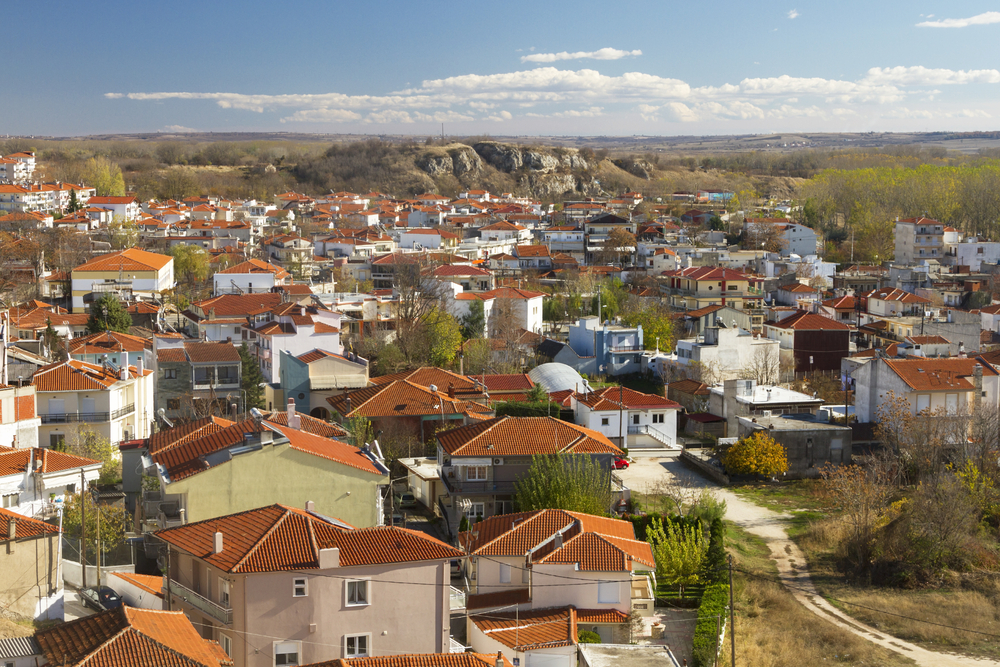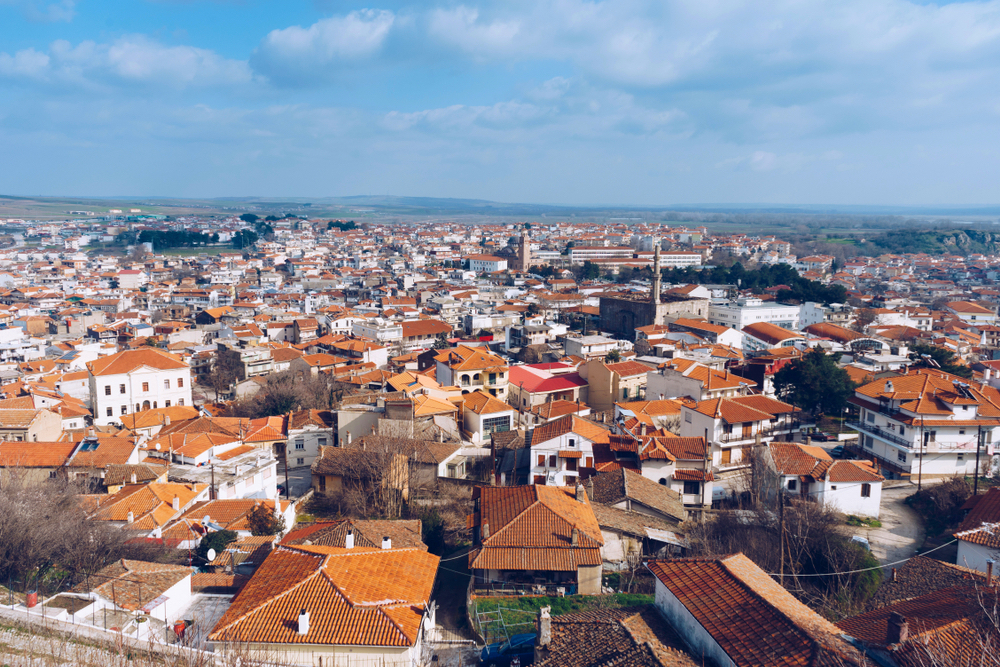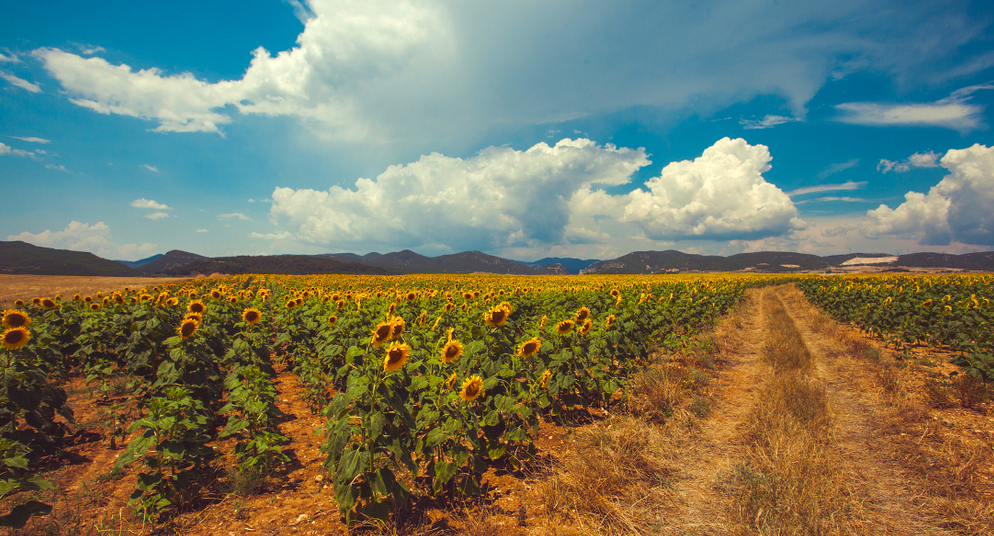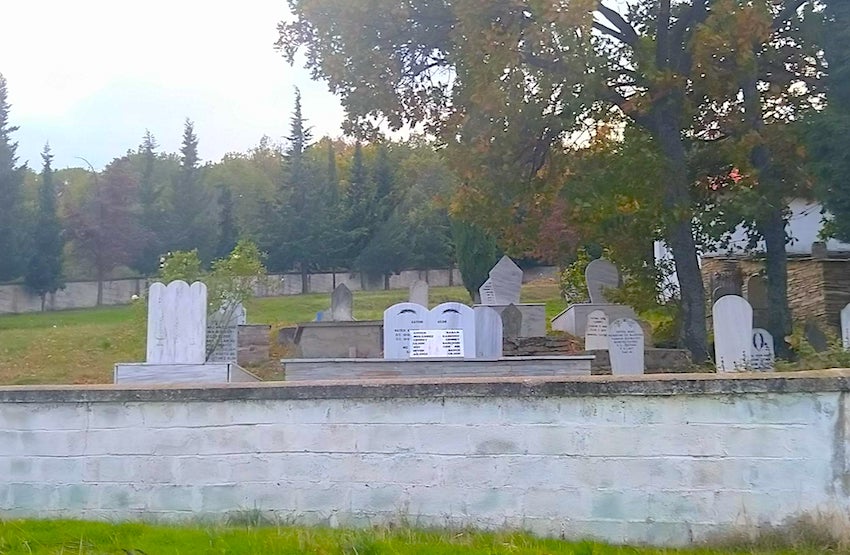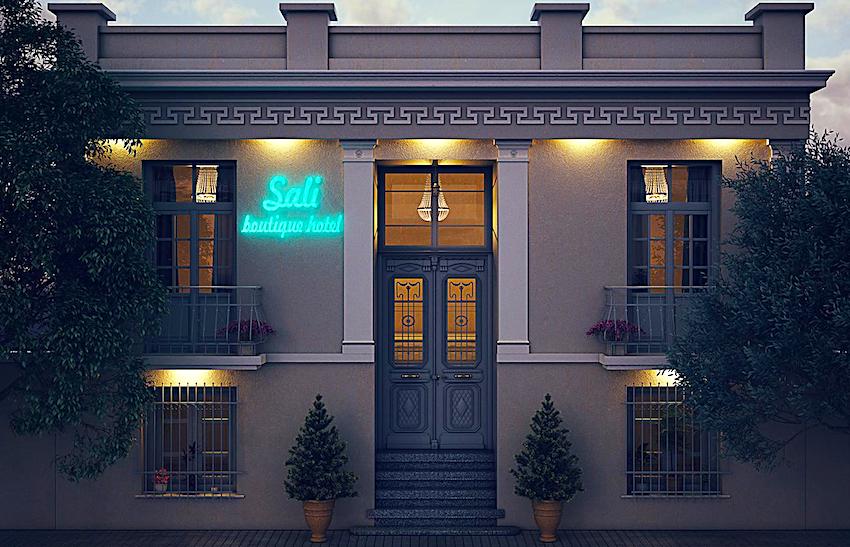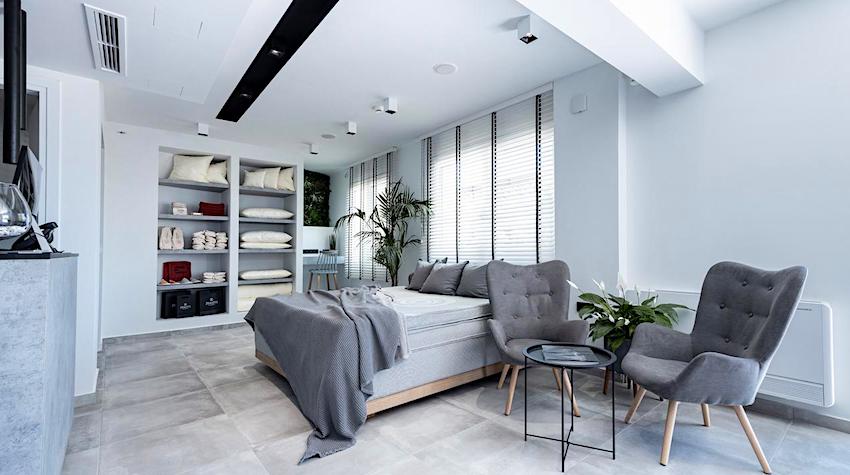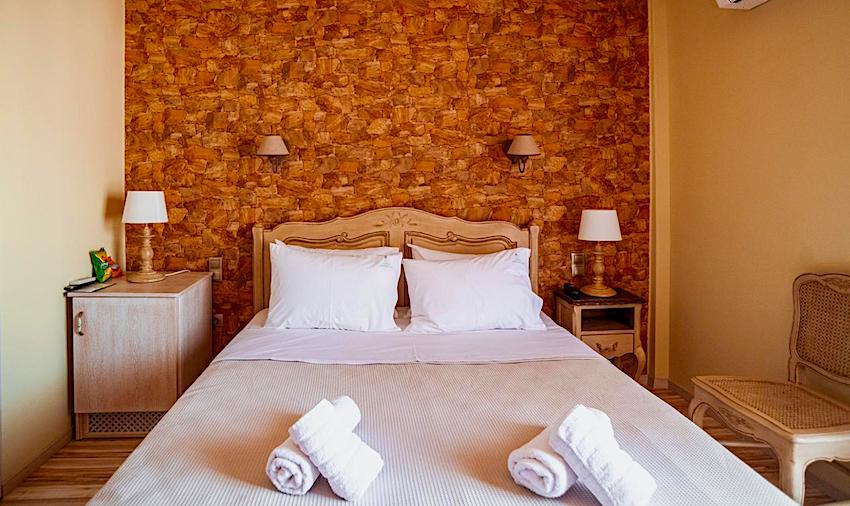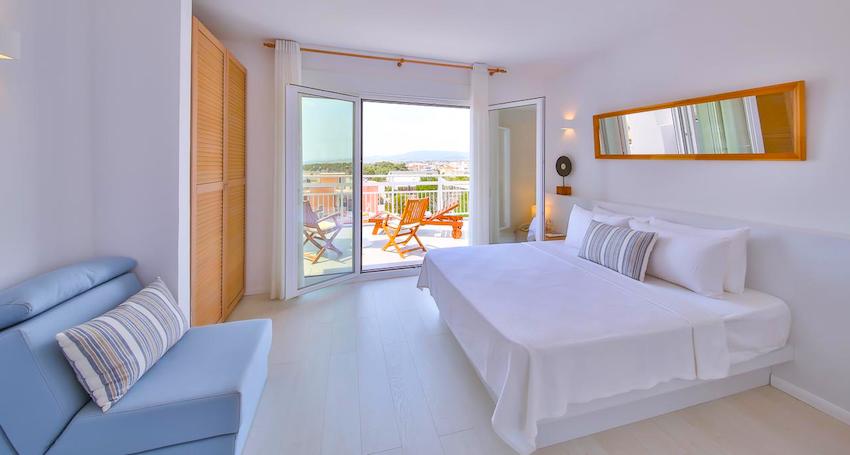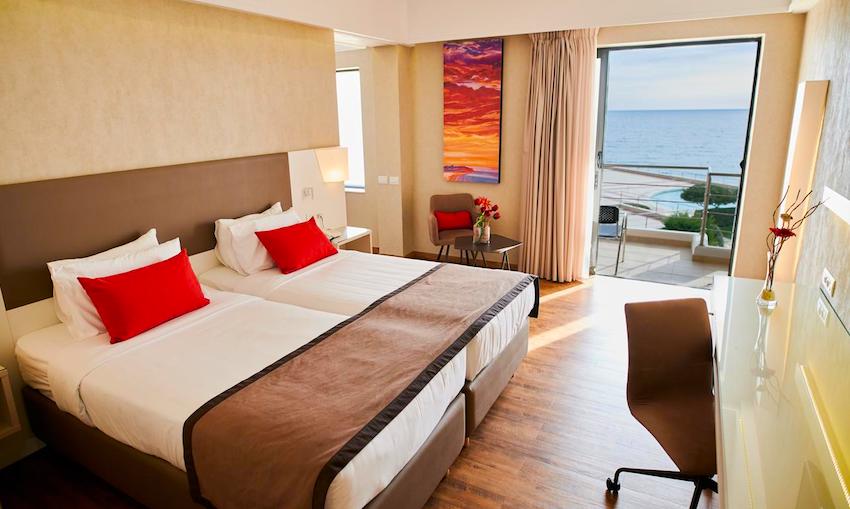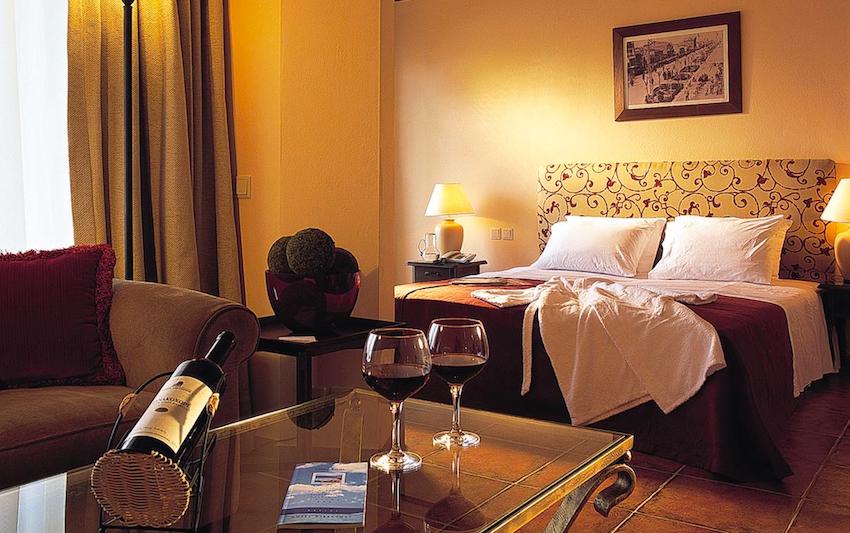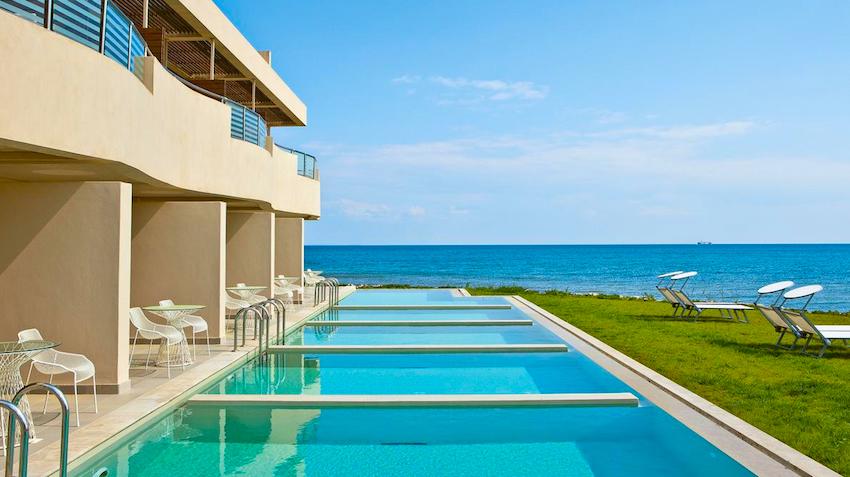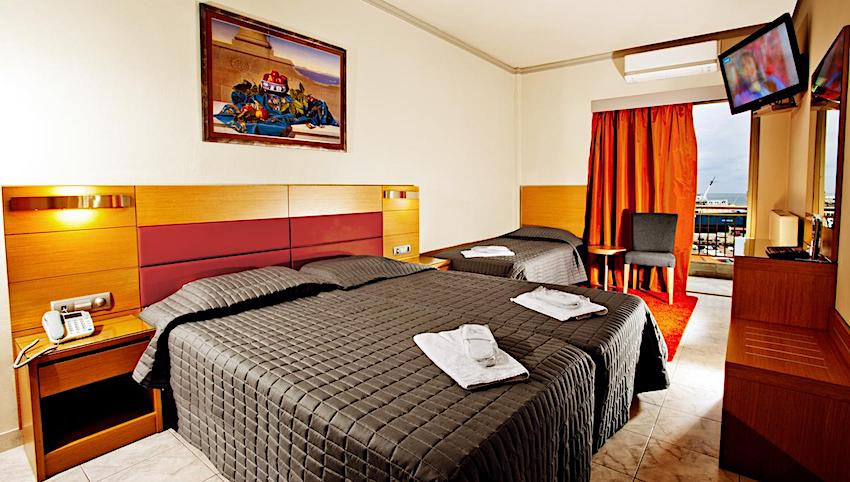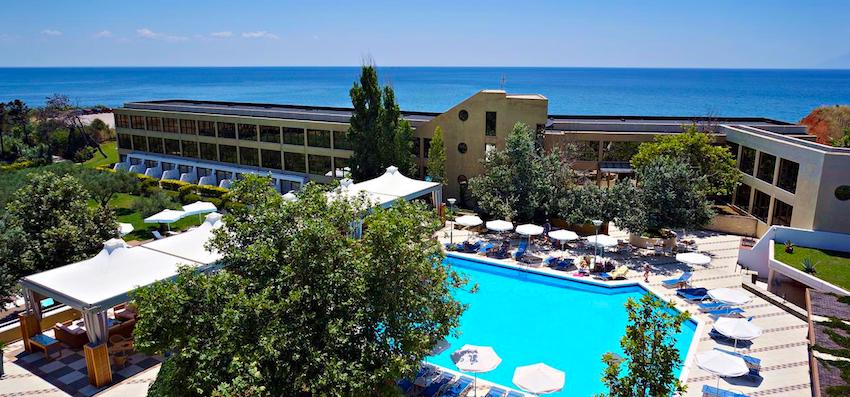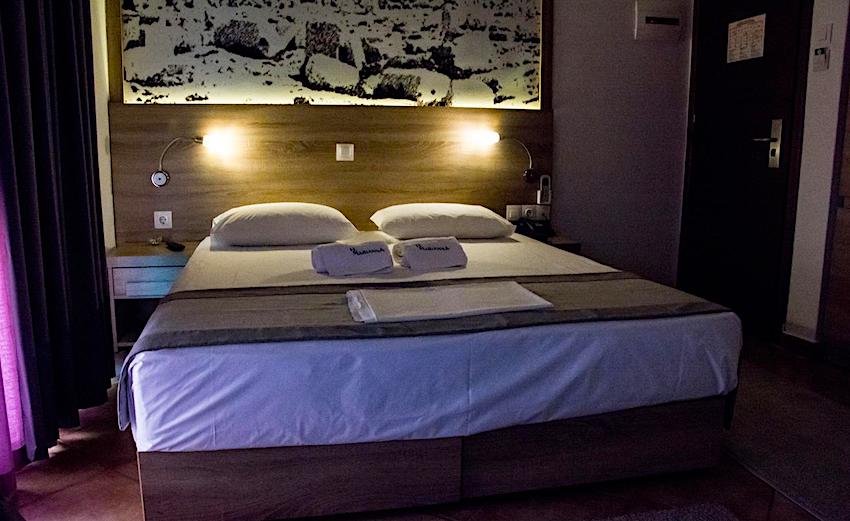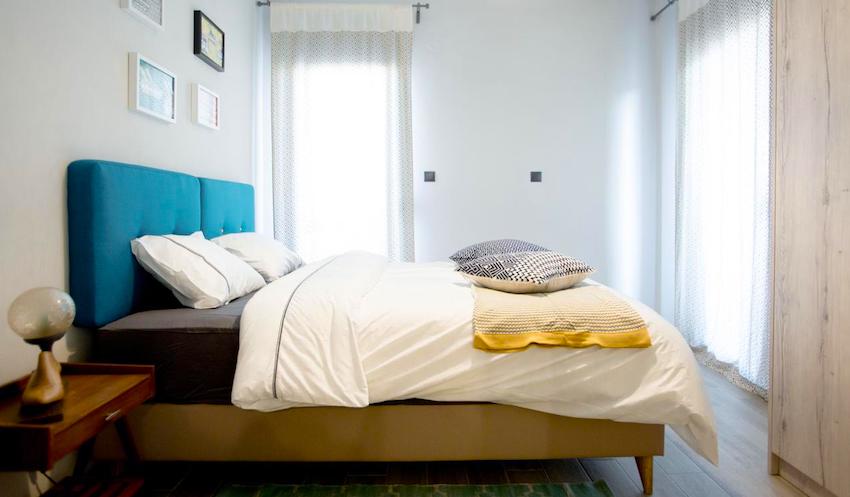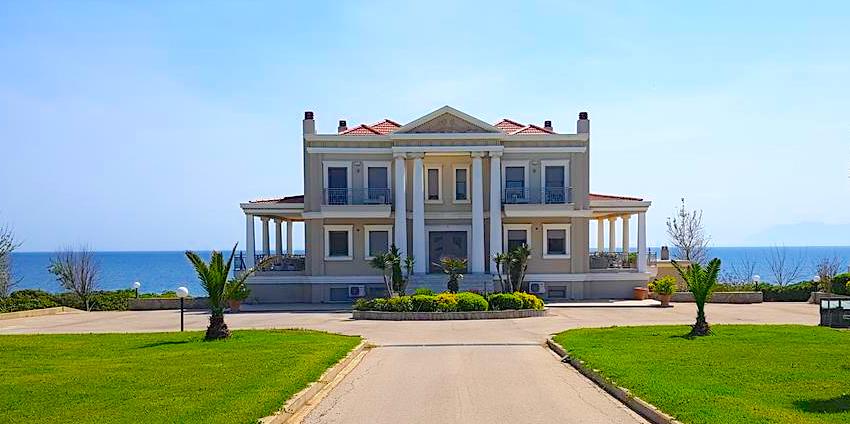
Evros
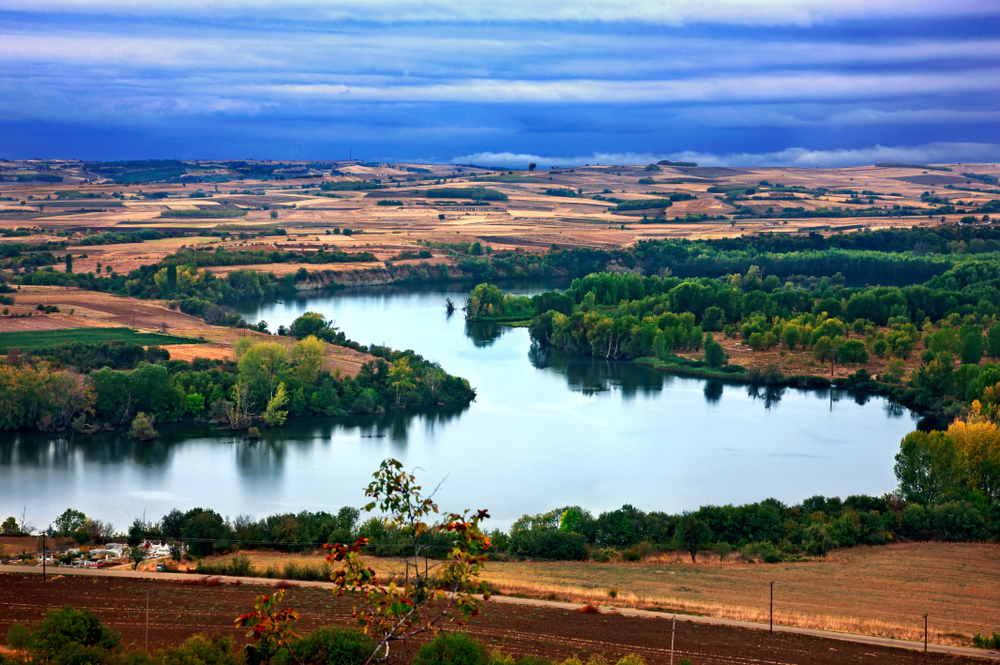
Evros River By Heracles Kritikos @Shutterstock.com
|
By Maria Verivaki Having a son serving the country in the far north, we saw an opportunity to plan a holiday there, primarily to see him, and at the same time, to learn about a part of the country that seems to make the Greek news on a daily basis, but which very few people visit for the sake of saying they have been there. The region of Evros represents the eastern borders of Greece, and for this reason, it is associated with mainly negative connotations. When I think of borders in a place like Crete, I think of coastline, beaches and tourists. When I think of land borders, two kinds come to mind: the kind you have between, say, countries like the Netherlands and Belgium, and the kind you have between countries like Greece and Turkey. In the former, we are talking about seamless travel based on trust and friendship; in the latter, documents are required to be shown at all times, and relations between the countries are at best inimical in our times, severely strained by the current politics playing out in the region. Now that I have visited the Evros region, when I think of land borders, what crops up in my mind is dense forests and rushing rivers, soldiers in camouflage and desperate people looking for salvation. These elements have also shaped the settlements of the region as well as the people who live there; border towns have always been associated with the darker aspects of daily life. |
|
|
|
Our son is serving in the city of Alexandroupoli, the capital of the Evros. Alextown (as I refer to it when speaking with my son - he calls it Alexpolis) is really quite the perfect place to live: cosmopolitan and peaceful, small and compact, close to everything, located along a long stretch of coastline, on flat terrain that makes it easy to walk and bike everywhere, and all roads lead to it. The main Evros news website describes Alextown as: "the capital of the Evros prefecture with a dominant position as the main gateway between the EU and the countries of the Mediterranean, Asia and the Black Sea region, a major internal EU border node, with rapid economic growth due in part to its port and railway station which are important centers of transit trade, and an emerging tourist center. It is a city of tradition and modernity, a city for relaxation and fun, uniting Europe and Asia, West and East, and connected by all means - land, sea and air. With a population of over 60,000 inhabitants, it offers a high quality of life, ensuring environmental balance and a continuous cultural upgrade, with a lively artistic and intellectual life, and multiple entertainment options. Whoa! For a city that has only existed for about a century, with humble beginnings as a fishing village in the 1850s, known at the time by the name of "Grandpa's tree" (in Turkish), that is quite impressive. From this last point, it is easy to understand how confusion reigns when trying to work out how the Evros region developed. Different sides will tell you a different story. But the truth is that Alextown is a nice place to live - it almost feels like my hometown Chania without the history - and it also feels safe, which should not be surprising given the high military presence in the region. Using Alextown as our base for a few days to explore the wider area, we decided to visit some other towns in Evros, hoping for a glimpse of the homonymous river Evros, which forms a natural border between Greece and Turkey. According to the map, this could be done as a one-day round trip. We hit the road after having a bougatsa breakfast in the town centre, taking the direction of the border with Turkey. We drove partly on the toll road of Egnatia (which basically follows the same route as the ancient Roman road Via Ignatia) to gain time, but the best part of a road trip is traveling on the non-highway roads, which take you through the towns and villages on the way. |
|
|
|
"They've sprayed foam all over the roadside," my daughter remarked. Cotton is an unknown quantity to Cretans. We were traveling during the period of the cotton harvest (late October). The roadside was heavily speckled by runaway cotton from the harvest. We saw fields full of cotton plants, tractors harvesting the cotton, and trucks carrying the harvested cotton to a drop-off point. We were surprised to see open trucks full of cotton - so cotton buds don't fly away? The cotton was basically dumped onto the ground as a first stop. Cotton produced in Greece follows a similar story to olive oil. We grow it, and then sell it to others to do what they like with it. Only about 10% of the cotton grown in Greece is processed here for industrial use. The rest is exported as is (much the same with olive oil: we produce it, and then sell most of it in bulk to Italy, who brands it as Italian olive oil). |
|
|
|
We made a short stop to see what looked like a castle overlooking olive fields in Avantas, where we also came across a disused railway station, adding an element of mystery to the deserted area. More unusual sights for Greek islanders like ourselves came into view: grazing cows, fields as flat as pancakes (a very rare sight in Crete, which is full of hills and mountains), road signs with foreign countries' names on them (Bulgaria and Turkey), instead of just pointing you in the direction of another town in your own country. We were driving on the same road as huge lorries with Turkish licence plates. Island life feels so sheltered. |
|
|
|
Arriving in the town of Soufli, located half a kilometre from the border with Turkey, we parked the car close to the town centre next to a train track which looked as though a train had not seen it for a long time. Many of the buildings were boarded up, and more than just a few had 'for sale/rent' signs on them. Some of those buildings looked like beautiful mansions, attesting to a time when the town was more prosperous, and politics had not ravaged its economy (the silk industry). Many buildings were now uninhabited. Failed businesses still had their signs on the dusty grimy shop windows. Some of the older buildings showed fading signs of the year of their construction, from the late 1800s. Soufli is now clearly a Greek border town with all that this entails. Historically, it was much larger than it is now, having lost a large chunk of the fields that were important in Soufli’s famous silk industry (they are now part of Turkey), hence the decline of nearly everything that Soufli once stood for as a large trading centre. It remains vestigial to this day at best. Although there are small signs of recovery, this will take a long time to come to fruition (the recently completed 'Wall' may play a part in this - see below). We hung around in Soufli in time to see school children waiting for the bus, sitting outside the boarded-up shops: Romani, Moslem and Greek students were waiting for the bus at the local KTEL, something we have NEVER seen in our own Greek town. Romani children rarely go to school in Crete, and it is rare to see Moslem school schoolgirls wearing a hijab. Here, young girls wearing hijab and jeans sat together, while a bunch of giggling Romani girls wearing conventional young people's clothing styles walked past them. Together with Rodopi, Evros comprises the Greek part of Western Thrace - Thraki, as we call it in Greece. (Eastern Thrace is in Turkey). These are the prefectures where the Greek citizens of the Moslem minority live. ‘Minority’ schools (known in Greek as (meionotika’) teach students 50/50 in Greek and Turkish. According to the Treaty of Lausanne (1922), Christians had to leave Turkey and be repatriated to Greece (except those living in Thrace), and Moslems had to leave Greece and be repatriated to Turkey (except if they lived in Constantinople, modern-day Istanbul). In Crete, Moslems were not allowed to stay on the island. There was no choice, no matter how much some pleaded to be allowed to stay, even asking to be baptised. The island was effectively ethnically cleansed. The Treaty of Lausanne still dictates the living conditions of the minorities on both sides, and it is generally abided by 100 years later, with some creative interpretation of the rules on both sides which still causes friction. If you are learning Turkish in a Greek school, you will have access to higher education in Turkey; many Moslem youth head that way eventually, leading to population decline and economic loss in the areas where the Moslem minority of Greece lives (in both towns and villages). Many of them also find partners from there - some stay in Turkey but many return to Greece (and other parts of the EU), injecting new blood into their respective communities. They are fully integrated Greek/EU citizens. |
|
|
|
There was one activity in Soufli that seemed to be in the midst of a frenzy. People were queuing up at all the chemists on the main street, getting tested for covid. There seemed to be much more mask-wearing than I saw elsewhere, even out on the street. Northern Greece is in the red for covid, and it also has some of the lowest vaccination rates. I didnt find this perturbing in any way because we are vaxxed, and we were never 'intimate' with anyone up north. Wherever we sat down to eat in the north, we were all asked for our vax certs, and we ate as a family, not amidst strangers. People in Greece generally maintain space between strangers except where it isnt possible, e.g., in a crowded bus, or on a plane with allocated seating. In and outside shops and at the supermarket, people do seem to be used to social distancing these days. Before we left Soufli, we saw a bus load of well-dressed ladies on a day tour from Alextown. So there is something to see in Soufli, apart from the well known silk industry, despite its decline in modern times. You need to make an effort to discover this, as well as good organisation. A few soldiers were also seen picking up their midday meals from what looked like an empty taverna. The neglect we felt here was also evident in the shops signs: who uses the word ‘tsigaradiko’ these days? No one seemed to care. Even the bougatsadika seemed to have been swallowed up in the vacuum - one had its door open but there was no sign of a bougatsa in the shop. It felt as if no one sat indoors anywhere (maybe it was frowned upon in covid times), and it wasn't really warm enough to sit outdoors all day in late October, even though a lot of people were in fact doing just that wherever we went in Evros. Efforts are being made to add cultural activities to the town's everyday life, but this remains difficult when the purpose of a town like Soufli is to signal the border of your country that has strained relations with its neighbours. We left Soufli feeling very despondent, trying to work out what was worth saving here. I noticed a chemist's sign, near where we parked out car, on a shop window which was immaculately clean. The shop was clearly no longer working. At least she had tried. |
|
|
|
On the way to our next destination, we caught a glimpse of the river Evros. Asking to see the river Evros can be interpreted by the army/police as an act of spying. The river is now bordered for more than 40 kilometres by a steel 6m-high fence, the Teixos (Wall). The point where we stopped was the closest we could get to the river Evros; we could see it just below us, but there was no sign of the fence. We didn't catch a glimpse of the Wall on this visit, but it is now becoming a popular place for a 'guided tour' (and understandably so). We stopped on the motorway and got out of the car, simply to gape in awe at this thin lethal stretch of waterway, densely forested on the Greek side, with a few mounds of black rubber visibly polluting the Greek riverbank, while low flat fertile land (Turkish territory) could be seen on the other side of the river. There was heavy military presence (‘sinoriofilakes’) in the area; the village of Amorio on the other side of the motorway was not accessible from the side of the road that we were driving on. Amorio was spread out over 2-3 kilometres and it looked deserted, although there were signs of life (a store with an open door). |
|
|
|
We had now reached Didymoteicho, where we were hoping to find a place for lunch. No one has anything nice to say about both Soufli and Didymoteicho, but their histories - albeit confusing, and often lost in time, as possession of the towns depended on who had won the war and what documents/buildings they decided to keep - point to a much greater complexity than what they are currently known for (Greek border towns). The centre of Didymoteicho was made up of a large number of narrow roads that looked worth exploring for the interesting architecture of the houses in the region. But they were void of human presence - nothing stirred - and this gave them a look of desolation. We were clearly tourists in the area, but these places were not tourist towns; it feels shameful that no one would want to visit places steeped in so much history which is important in the development of Greece itself. Such towns tell us what we lost and what we gained. It's not as though border towns have nothing to offer. The problem is that these towns suffer from the prejudice of being a border town, which is characterised by heavy military presence, their main reason to exist. People still work in their family-owned fields in this region, and there is a large dairy industry which provides commodities like milk and feta cheese all over the country. Like Soufli, development in Didymoteicho is also slow and often thwarted by politics. The famous Greek singer Giorgos Dalaras knew what he was talking about when he wrote "Didymoteicho Blues": Διδυμότειχο blues τ' όνομά του είναι αιτία (it’s name is the reason) https://www.youtube.com/watch?v=Nahk-hwGDPw |
|
|
|
The shops in Didymoteicho (the ones that were working) were closing for the day, and there didn't seem to be any real sign of a decent place to have lunch there. I saw a butcher's still open, with a sign saying that it sold 'kavourma', a kind of boiled-down beef shaped into large sausages (similar in taste and texture to corned beef), which is typical for the region. It is is used in a similar way to bacon, salami and other cured meats, to add flavour to meals and as a filler. I suddenly remembered our friend back in Crete who was from Feres, a small town south of Soufli, close to the Greece-Turkey border. He had thrown a black stone behind him (as we say in Greek) when he left Evros, never wanting to return. When he heard we were going to tour the region ('really?' he said) he told us about kavourma and to bring him some if we could find it. So we plucked up the courage and went into the store to ask about kavourma, an unknown quantity to us. It felt so good to be finally talking with a human being again, after our visit to Soufli did not quite go as planned - as travelers, we had other expectations. We chatted with the owners (a husband and wife team) about kavourma and the problematic aspects of living in a border town. They also referred us to a local mayeirio that was open for lunch - the only place open - which served classic (mainly meat-based) Greek dishes (it was also used by border soldiers to pick up their meals for the day – we arrived there half an hour before it closed). Didymoteichon is actually quite a pretty town with a long history, and it lends itself well for urban exploration. I did not throw a black stone behind me like our friend did. I would like to return to see it in greater detail. |
|
|
|
Our next stop was supposed to be the northernmost town of Orestiada, but we realised we had run out of time and phone batteries, hence we were getting worried that we would end up in the darkness with no GPS signal. We then started traveling the old-fashioned way - using road signs to guide us. Our reason for wanting to go through Orestiada is because our son was supposed to be living there, after initially being stationed in the northernmost village of Greece (Ormenio) on the tri-border. (By a stroke of luck, he avoided this situation, but that is another long story.) We would have to leave Orestiada for another time (like when we return to Didymoteicho), so we decided to drive south back to Alextown, using the country roads rather than the highway, to make a round trip and to see more of the region. A turn west took us close to the Greece-Bulgaria border (we had been traveling up to that time along the Greece-Turkey border). On the map, the route looked enticing, dotted with villages that were located close to one another. We drove back through the area that we couldn't enter when we were driving to Didymoteicho. Amorio actually seemed like a normal village up close. This time, it was forbidden to take the turnoff for Didymoteicho. So this was clearly a road block set up by police and the military to stop unwanted trespassing, i.e., to prevent illegal immigrants from making their way into the country after crossing the river Evros. |
|
We turned off at the village of Mandra to drive westwards, passing a shed with a faded sign: 'Cabaret Show Fantasia'. At this point, we were being slowed down by a very long truck, guided by vehicles both in front of it and behind. It was carrying a very large round object which we couldn't quite place. Eventually, the vehicles slowed down so we could pass them. We realised later that it was delivering wind turbine parts to a drop-off point. There were in fact many wind turbines on the hills in front of us. From a river, the border had now morphed into dense silent forest in brilliant autumnal colours. Just one car passed us, carrying a sign with the owner's name on it: Siopis ('silence'). In a recent article about Thraki, the author writes: "It is a strange place. This is not the kind of place one would normally direct tourists. Thraki has shades of sunset. It is melancholy, with a brave loneliness. You drive through the night in your car looking for a light in a house, a glimpse of a TV playing behind a window. Nothing." |
|
|
|
Apart from the vehicles on the road, there was no other sign of human presence, unless I could class the cemetery that we passed along the way. And this too was curious: it was a Moslem cemetery and quite a large one for that matter. We ended up at the sleepy village of Mikro Dereio, which was edged by a pretty church. There also seemed to have once been a cafe and restaurant working on the main square, but they were now closed. Maybe they did work in the warmer months when there were more people traveling through the region; once again, the area looked deserted, in the same way as most of the places that we passed by. Every now and then, we caught a glimpse of smoke coming out of a chimney. Finally, a sign of human life! A man was walking out of his house to a taxi. We asked him for the best road to get back to Alextown. 'Oh, you want to go to Mega Dereio first,' he said. 'But you must hurry because it's getting dark.' We now realised that we could not avoid nightfall. We asked him if the road was 'good', i.e., with tarmac, and not a dirt track which would make it difficult to drive on. 'No problem,' he said, ' the road is good but you have to watch out for Pakistanis. Don't stop when you see branches on the road.' We let the meaning of his words sink in, and turned on our phones to see how long the route to Mega Dereio took. There were two roads: one was a few minutes longer than the other. We decided to take the slightly longer route – what are a few minutes more on the road after all? (During our travels, other people said the same thing to us - some called the Pakistanis Afghanis, others called them illegal immigrants.) |
|
|
|
We were now entering Roussa, a beautiful village spread out over rolling low green hills. Cows were grazing on one side, and geese were waiting for us to drive past, so that they could cross the road (just like we see in films!). Greek flags were gently waving in the cold breeze outside nearly every house (it was the day after the 28th of October, a major national holiday), and in the centre of each village, there was a mosque with a tall minaret that could be prominently viewed from far away. A young woman riding a motorbike stopped and knocked on the door of a large house. She was wearing black tight jeans and a black leather jacket. Surprisingly, a cafe was open, where I could hear Greek being spoken. Alas, we had no time to stop and sit with the patrons, because darkness was setting in. The door opened and a lady in hijab and pantaloons came out. She looked surprised to see us. Her house was next to the cafe. Our car surprised most people in the area, so we waved to them as a form of greeting. The older woman looked confused with our presence - not many strangers would be passing through here. Perhaps we should tell her where we are heading. 'Is this the way to Monastiraki?' I asked, mentioning the next village on the map. 'Monastir?' she said, in the sweetest voice I have heard in a long time. She pointed in the direction of the village. We thanked her and went on our way. It felt strange that everyone was speaking in Greek to us (albeit in a slight accent), but in another language when they spoke to each other and the names of the villages were all in Greek. You couldn't really tell the Greek-heritage population from the non-Greek heritage, unless, for example, the women are wearing a hijab, or someone makes the sign of the cross. |
|
We continued to drive along the route we had seen on the GPS. But the road seemed longer than what we thought it would take. Maybe it was the descending darkness, coupled with the fact that we really did not know where we were going. The villages clearly had a Moslem dominance despite their very Greek names - every one of them had a mosque. At the village of Ourania, we began to worry. We felt lost, despite the road signs. Our phone batteries were dying one by one. When I initially looked up the route we wanted to take, Google maps often directed me to take the road via Bulgaria. This was now starting to make sense. We took every tarmac road we could find. It still looked like we could continue on to Mega Dereio as the taxi driver had instructed us to go to, but we no longer stopped for photographs. What would we take in the darkness anyway? Not that there was nothing to see: on the way, we passed signs with directions for Megalithic Tombs, and Rock Engravings. We would just have to try to come again. |
|
Along the route, we saw a Moslem couple piling their children into a truck, smiling and waving to us as we drove by. Among the lush green valleys, we saw more mosques and Moslem cemeteries. It was eerily beautiful, and like nothing we had ever seen before. It did come across to us as if we were not in our own country, but then again, Crete also feels foreign to many Greeks. At the same time as worrying about where exactly we were heading, we also marveled at the wealth of diverse landscape in our own country. At the village of Kissos, the road seemed drivable, so we plodded on courageously - until we came across the dirt tracks. At one point, it seemed that all the roads we took ended up as a dirt track. We couldn't understand what we were doing wrong. A Moslem woman was walking on the side of the road, pushing a wheelbarrow. It wasn't easy to see what she was doing as night was falling. She never once recognised our presence. It felt as if she was faceless. She did not stop or even look at us as we passed. At the same time, we saw a man on the other side of the road. He had a friendly smile on his face and he waved to us as we passed by. We stopped and asked him how to take the road back to Alexandroupoli. 'You have to turn back for Mega Dereio', he said. I thought that this was in fact where we were heading. 'Can't we go from here?' I asked, as there looked like a road existed according to the GPS. He laughed. 'Not in this car! The road is a dirt track for 10 kilometres'. We realised we had to turn back and take the 'shorter' road to Mega Dereio (which was also covered partly in dirt track). |
|
We finally arrived at Mega Dereio, which was also a Moslem village (Mikro Dereio was Christian), but the road was still not all tarmac. From this point on, all we could see was darkness, and the silhouettes of hills and forests. There was no sign of life, except when we passed a building which had the name of a military camp on it (there were many camouflage-painted sheds on the roadside) and that is when the road became cement again (we were very thankful we had not suffered any flat tires). But where were the soldiers? Further up the road, we saw one sole person outside the camp. But he wasn't dressed in camouflage, and the words of the taxi driver came to mind: Don't stop anywhere. At Aisimi, we saw street lights, but there were still no lights in the few houses of the village. Avantas was slightly busier (I think I saw one light on in a house). Finally, we saw the sign pointing us in the direction of Alexandroupoli. We had arrived back to civilisation. For more information about Thrace see Matt's Guide to Alexandroupolis and Maria's Xanthi Page |
Hotels in Alexandroupolis |
|
Located in a neo-classic mansion in central Alexandroupoli 5 minutes from the Lighthouse, Sali provides express check-in and check-out, non-smoking rooms, a garden, free WiFi and a bar. Featuring room service, this property also welcomes guests with a restaurant and a terrace. Rooms come with a balcony. At the hotel, every room includes a patio with a garden view. Complete with a private bathroom equipped with a shower and a hairdryer, all guest rooms
at Sali have a flat-screen TV and air conditioning, and certain rooms will provide you with a seating area. The rooms feature a closet. The accommodation offers a continental or à la carte breakfast. |
|
Featuring a bar, terrace and views of city, 31 Doors Hotel is located close to the sea, restaurants and nightlife in Alexandroupoli, an 8-minute walk from the EOT Beach. This 3-star hotel offers a concierge service and luggage storage space. The property has a 24-hour front desk, airport transportation, room service and free WiFi throughout the property. All rooms features air conditioning, a flat-screen TV with satellite channels, a fridge, a coffee machine,
a bidet, a hairdryer and a desk. With a private bathroom equipped with a shower and free toiletries, some rooms at the hotel also feature a sea view. |
|
Lighthouse Hotel provides non-smoking rooms, a bar, free WiFi throughout the property and a shared lounge. The property is close to several well-known attractions, a 7-minute walk from Mitropolis Square, 2,100 feet from Flora and Fauna Museum and an 8-minute walk from Church of Agios Nikolaos. The property has a 24-hour front desk, room service and ticket service for guests. At the hotel, all rooms are equipped with a closet. Complete with a private bathroom
equipped with a shower and a hairdryer, all guest rooms at Lighthouse Hotel have a flat-screen TV and air conditioning, and certain rooms will provide you with a seating area. Guest rooms will provide guests with a desk and an electric tea pot. |
|
Located in Alexandroupoli and with Light House and restaurants reachable within a 10-minute walk, Dias Hotel has express check-in and check-out, allergy-free rooms, free bikes, free WiFi and a garden. With a bar, the property also has a shared lounge. The property provides a 24-hour front desk, room service and currency exchange for guests. At the hotel, all rooms include a closet. Complete with a private bathroom equipped with a shower and a hairdryer, all
rooms at Dias Hotel have a flat-screen TV and air conditioning, and selected rooms also offer a patio. Guest rooms will provide guests with a fridge. |
|
Ramada Plaza Thraki is set on a private beach at the west end of Alexandroupolis. Known for its top-rated conference facilities, the 5-star hotel also offers 2 outdoor pools, while a luxurious spa is accessible to guests over 16. Each of the tastefully decorated rooms features a spacious balcony with view of the swimming pools and the Aegean Sea. In-room amenities include air-conditioning, 32 " LED TV with video-on-demand and free internet access. Upon arrival,
2 bottles of water and fruits are offered. Featuring 4 hydrotherapy pools, the hotel’s Thalasso & Wellness Spa includes 14 treatment rooms and a relaxation area with health bar, available to guests over 16 years old. Guests enjoy free access to the fully equipped fitness center, while a range of outdoor sports activities may be enjoyed. |
|
Nestled amid a verdant pine forest, beachfront Grand Hotel Egnatia is yet within walking distance of the city center. There are plenty of facilities, including a fitness room, stunning outdoor swimming pool and a refined restaurant. The elegant rooms and suites are tastefully decorated, featuring exquisite designer fabrics. Each with a breathtaking view over the Thracian Sea, the air-conditioned rooms come with free Wi-Fi, a satellite TV, DVD player and mini-bar.
Note that this hotel is on the same property as the Hotel Astir listed below so there may be some confusion as to which is which. |
|
Boasting an indoor pool, an outdoor pool and magnificent sea views, Astir Alexandroupolis is located right on the seafront of the scenic Alexandroupoli. Guests of this state-of-the-art hotel enjoy free access to its fitness center, sauna and hammam. Blending comfort with refined luxury, the well-appointed rooms at Astir Alexandroupolis are decorated in warm earthy tones. Some rooms feature their own private pool. Each offers a spa bathroom with chromatotherapy,
along with free toiletries and hairdryer. A satellite TV is available in every room. Each opens to a balcony with views of the azure waters. Air conditioning comes standard. Note that this hotel is on the same property as the Grand Hotel Egnatia listed above so there may be some confusion as to which is which. |
|
The centrally located Hotel Erika in Alexandroupolis offers rooms with sea view. It is just 350 feet from the lighthouse and the port. The local market, bus and train station are nearby. Rooms are decorated in a modern style and have electronic locks, 24-hour hot water, self-controlled air conditioning, a large balcony and a 42'' LCD TV. Guests can start their day with a delicious Greek buffet breakfast. For the whole day, coffee and drinks are served at the Erika
Cafe-Bar. Free WiFi access is available in all areas. |
|
Overlooking the azure waters of the Aegean Sea, Alexander Beach is just 1.2 mi away from the city center of Alexandroupolis. It offers spa facilities, 2 swimming pools and elegant accommodations. Guests at Alexander Beach Hotel & Spa are welcomed with a bottle of wine and a basket of fruits. Rooms and suites are equipped with a satellite LCD TV, mini bar and bathrobes. Some rooms also enjoy unobstructed sea views. The Symposio Restaurant is the ideal choice
for unique dining experiences, providing a wide wine selection. Guests can also enjoy a drink or cocktail from the bar at the hotel’s stylish lounge area. The Casino Thraki operates within the hotel's premises and guests are granted free entrance. |
|
Hotel Marianna offers soundproof rooms 650 feet from downtown Alexandroupoli. Guests benefit from free WiFi throughout. Alexandroupoli airport and port are only 1.9 mi and 0.6 mi away respectively. Rooms at the Hotel Marianna are simple and functional. Each is air conditioned and heated, and has a private bathroom with toiletries and hairdryer. A mini-bar and LCD TV are standard. |
|
Located in Alexandroupoli with EOT Beach and Light House of Alexandroupoli nearby, Traveller's Apartments provides accommodations with free WiFi and free private parking. The units come with tiled floors and feature a fully equipped kitchen with a fridge, a dining area, a flat-screen TV with cable channels, and a private bathroom with shower and a hairdryer. Some units are air-conditioned and include a balcony and/or a terrace, as well as a seating area. |
|
Located close to Alexandroupoli on the beach with New Chile Beach reachable within a 14-minute walk, Villa Alexandro's has accommodations with free WiFi, BBQ facilities, a garden and free private parking. Each unit comes with a patio, a fully equipped kitchen with a fridge, a seating area with a sofa, a flat-screen TV, a washing machine, and a private bathroom with shower and a hairdryer. Some units have a dining area and/or a balcony. The villa has a
sun terrace. |
| You can find more hotels by using Matt's Alexandroupolis Hotel Search or find villas, apartments and holiday homes with Matt's Alexandroupolis Villa Search |
Return to Matt's Thrace Index |
Help Support Matt's Greece Guides
Do you enjoy using my site? Have you found it entertaining as well as useful? If so please show your appreciation by booking hotels through the travel agencies and the links found on my Hotels of Greece site. The small commission I
make on the bookings enable me to keep working and in most cases you won't find them any cheaper by searching elsewhere.
You can find
hotels in Greece by location, price, whether or not it has a swimming pool, and see photos and reviews by using this link to booking.com which also contributes to my website when you book. If you are appreciative of all the free information you get on my websites you can also send
a donation through Paypal or Venmo
Join Matt Barrett's Greece Travel Guides Group on Facebook for comments, photos and other fun stuff. If you enjoy this website please share it with your friends on Facebook and other social media.
